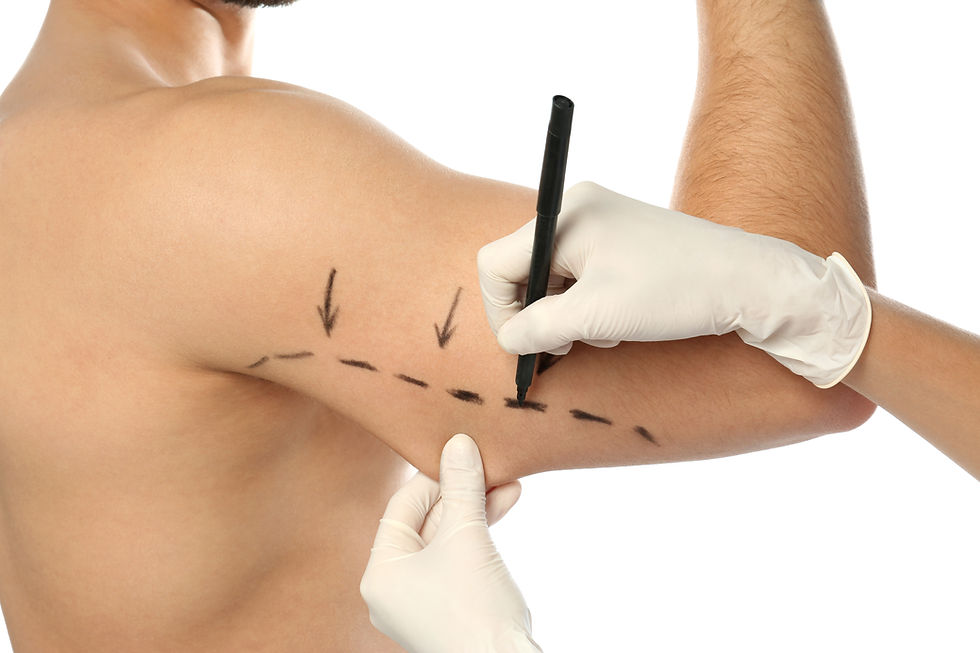Liposuction Lipoplasty in TURKEY ANTALYA
- gokhanozerdem
- 6 Oca 2022
- 3 dakikada okunur
What is liposuction?

Liposuction, sometimes referred to as "lipo" by patients, slims and reshapes specific areas of the body by removing excess fat deposits and improving your body contours and proportion.
What liposuction can treat
Abdomen
Ankles
Arms
Buttocks
Cheeks
Chin
Hips
Knees
Neck
Thighs
Upper arms
Waist
Liposuction can be performed alone or along with other plastic surgery procedures, such as a facelift, breast reduction or a tummy tuck.
What liposuction can't do
Liposuction is not a treatment for obesity or a substitute for proper diet and exercise.
It is also not an effective treatment for cellulite—the dimpled skin that typically appears on the thighs, hips and buttocks—or loose saggy skin.
Who is a good candidate for liposuction?
Liposuction is a highly individualized procedure. You should do it for yourself, not to fulfill someone else's desires or to try to fit any sort of ideal image.
Who is a good candidate for liposuction?
In general, good candidates for a liposuction include:
Adults within 30% of their ideal weight who have firm, elastic skin and good muscle tone
Healthy individuals who do not have a life-threatening illness or medical conditions that can impair healing
Nonsmokers
Individuals with a positive outlook and specific goals in mind for body contouring
If you are bothered by excess fat deposits located anywhere on your body that don't respond to diet or exercise, liposuction may be right for you.
What are the risks of liposuction?
The decision to have plastic surgery is extremely personal. You will have to decide if the benefits will achieve your goals and if the risks and potential complications of liposuction are acceptable.
You will be asked to sign consent forms to ensure that you fully understand the procedure and any risks and potential complications.
Liposuction risks include:
Anesthesia risks
Bruising
Change in skin sensation that may persist
Damage to deeper structures such as nerves, blood vessels, muscles, lungs and abdominal organs
Deep vein thrombosis, cardiac and pulmonary complications
Fluid accumulation
Infection
Irregular contours or asymmetries
Irregular pigmentation
Need for revision surgery
Persistent swelling
Poor wound healing
Rippling or loose skin, worsening of cellulite
Swelling
Thermal burn or heat injury from ultrasound with the ultrasound-assisted lipoplasty technique
These risks and others will be fully discussed prior to your consent. It is important that you address all your questions directly with your plastic surgeon.
Secondary procedures may sometimes be recommended to reduce excess skin. Special considerations are needed when large amounts—usually more than five liters of fat—are suctioned.
What should I expect during my liposuction recovery?
During your liposuction recovery, a compression garment or elastic bandages may cover treatment areas once your procedure is completed. These help to control swelling and compress the skin to your new body contours.
In addition, small temporary drains may be placed in existing incisions beneath the skin to remove any excess blood or fluid.
You will be given specific instructions that may include:
How to care for the surgical site and drains
Medications to apply or take orally to aid healing and reduce the potential for infection
Specific concerns to look for at the surgical site or in your general health
When to follow up with your plastic surgeon
Be sure to ask your plastic surgeon specific questions about what you can expect during your individual recovery period:
Where will I be taken after my surgery is complete?
What medication will I be given or prescribed after surgery?
Will I have dressings/bandages after surgery?
How long will I wear the compression garment?
Are stitches removed? When?
When can I resume normal activity and exercise?
When do I return for follow-up care?
It may take several months for the swelling to fully dissipate. As it does, your new contours and enhanced self-image should continue to develop.
What results should I expect after liposuction?
The results of liposuction will be long lasting, provided you maintain a stable weight and general fitness.
Your improved body contour will be apparent when the swelling and fluid retention commonly experienced following liposuction subside.
As your body ages, it is natural to lose some firmness, but most of your improvement should be relatively permanent.
Although good results are expected from your procedure, there is no guarantee. In some situations, it may not be possible to achieve optimal results with a single surgical procedure and another surgery may be necessary.
It is not possible to improve lax skin tone with liposuction.
Following your physician's instructions is key to the success of your surgery.
It's important that the surgical incisions are not subjected to excessive force, swelling, abrasion or motion during the time of healing. Your doctor will give you specific instructions on how to care for yourself.
This article was taken from AMERICAN SOCIETY OF PLASTIC SURGEONS web page:
https://www.plasticsurgery.org/cosmetic-procedures/liposuction




Yorumlar